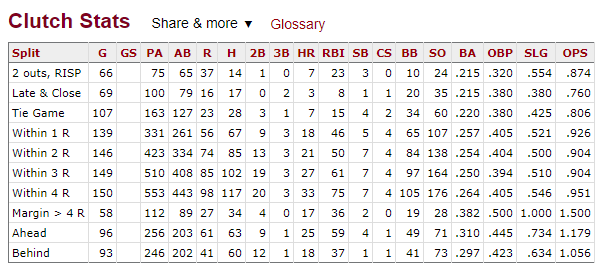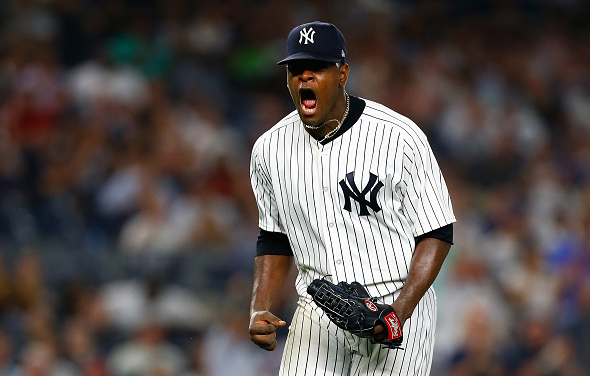Being “clutch” is a polarizing term used in baseball. First of all, nobody agrees on what it really means. Everyone has a different opinion on it; some look at numbers to tell the story while others use their eyes. A player’s October resume is often used to determine his clutch-ness, while some — keep in mind these fans are irrational — feel that unless a player hits a walk-off home run every time they are presented with the opportunity, then they are not clutch.
I like to look at how a player performs in high-pressure situations. I’ve seen players wilt in big spots while others flourish. Performing under pressure — being “clutch” — is as real as batting average and ERA, it’s just not as easily to quantify.
Hearing this -3.9 MLB leading clutch rating about Judge is annoying. Have you heard about it? @Andrew_Rotondi
— Kyle James ORourke (@KO_23_) September 27, 2017
This whole thing about Aaron Judge being clutch spiraled from FanGraph’s blog on Wednesday which produced that clutch number Kyle is referring to. Even by their own admission, FanGraphs said their clutch stat is an imperfect way of determining how clutch a player is. It uses Win Probability Added (WPA) and Leverage to come up with a final clutch number (because people love numbers).
What their number-crunchers have determined is that Judge’s -3.87 clutch score makes him the least clutch player in Major League Baseball this season, which is quite the headline considering Aaron just bashed his 50th home run of the season and is one of the two front-runners for AL MVP.
Per FanGraphs: The majority of players in the league end up with Clutch scores between 1 and -1, with zero being neutral, positive scores being “clutch”, and negative scores being “choke”. Only a few players each year are lucky enough (or unlucky enough) to have extreme Clutch scores.
According to FanGraphs, Judge is a gigantic “choke.” I think it’s important to set some context: Mike Trout, the unanimous best player in baseball 5 years running, has a career clutch score of -2.24. Jose Altuve, Judge’s biggest competition for MVP, has a -0.63 clutch score this season and a -2.45 career total. Melky Cabrera – yes, The Melk Man – leads MLB with a 2.17 clutch score, and Didi Gregorius, the player all Yankees fans want up in a big spot, has a slightly below neutral clutch score of -0.12. Are you taking Melky over Trout, Altuve, or Judge? Absolutely not. It’s just another stat for people to overreact to.
Has Judge been clutch this season? No. Overall with RISP he is slashing .255/.381/.621. His batting average is quite a bit lower than his non-RISP average (.297), but his slugging percentages are virtually the same. Judge is never going to be a for-average hitter, so worrying about his .255 BA seems silly.
Judge’s choke-ness, as FanGraphs puts it, really shows up is in high-leverage situations where he is slashing .211/.355/.484. That is good for an .840 OPS, which is 203 points below his season mark. His saving grace, on-base percentage, is attributed to pitchers being afraid to pitch to him with men on, which should but doesn’t count for a lot in FanGraph’s metric. Very often Judge keeps rallies going with a walk, which has a lower impact on his clutch score than a hit would. Judge turns back to the dominant force that may earn him the MVP award in medium- and low-leverage spots, where his OPS is 1.031 and 1.125, respectively.
Part of the reason Judge’s FanGraphs clutch score is so drastically low is because it measures him against himself, meaning it evaluates Judge in high-pressure spots vs Judge in medium- and low-pressure spots. Because his numbers are in those spots are miles apart, his clutch score is low. So relax everyone, FanGraphs is not saying Judge is the worst player in baseball.
Take this line from FanGraphs’ explanation of clutch score: It also compares a player against himself, so a player who hits .300 in high leverage situations when he’s an overall .300 hitter is not considered clutch.
That logic is totally flawed and where they lose me. There is something to be said for performing at a steady rate no matter what the situation is. It’s the reason Derek Jeter was labeled clutch; he had a .310 career regular season batting average and a .308 postseason batting average, which is when the competition and pressure were highest. Additionally, his batting average in high-leverage spots was .311 and his BA with RISP was .301 – remarkably consistent. Jeter’s FanGraphs clutch score of 0.48 (slightly above neutral) doesn’t do a good job at evaluating how reliable Jeter was in “clutch” moments. Jeter wasn’t suddenly going to start hitting .375 with runners in scoring position because he wasn’t a .375 hitter. He was a .310 hitter, which is what the Yankees got from April through November, with runners on base and with the bases empty, and in rain, sleet, and snow.
Is Aaron Judge clutch? #Yankees (disclaimer: not a trick question)
— Andrew (@Andrew_Rotondi) September 27, 2017
The biggest reason Judge is not considered clutch is because he was not consistent this season. All that will be thrown out the window next week however, because the reality is October will dictate if people consider him to be clutch. Just like it did for Alex Rodriguez, playoff baseball will make-or-break Judge’s Yankees career.





